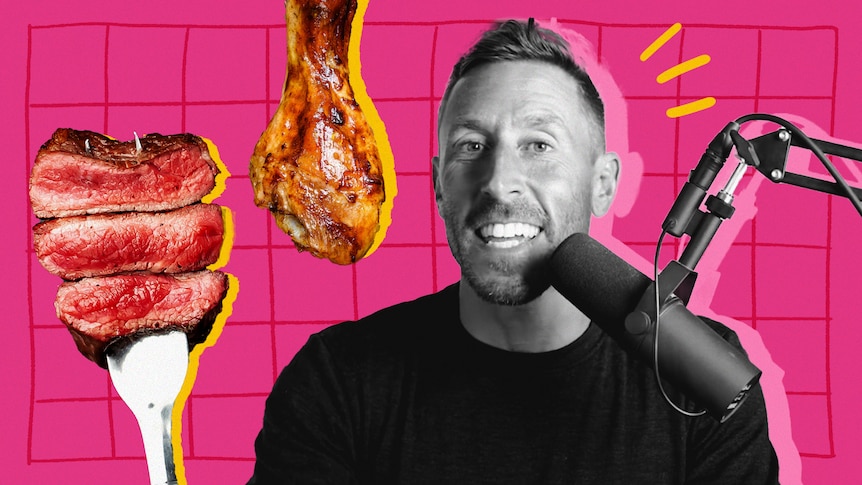“Think like a plant,” Paul Saladino, known to the internet as Carnivore MD, tells me from the confines of a YouTube video.
He’s trying, as he often does, to convince the world that vegetables are probably not good for us, and a diet consisting almost completely of meat is the best way to “thrive.”
“If we think about this intuitively, high level, without getting into the science… plants are going to put all their defense chemicals in those parts of the plant” Saladino says.
It’s one of his few video posts in which he wears a shirt. In fact, it’s a habit amongst carnivore influencers to appear shirtless, barefoot, and generally as closely resembling “our ancestors” as possible.
Another influencer, known as Liver King, addressing his followers as “primals”, roars to the camera about the merits of going shoeless.
loading
“You get connected, anchored to the earth, [because] why would you ever let your environment dominate you?” Liver King says.
Content like this is the most extreme expression of carnivore culture online. Many of these influencers have monetized their social media presence and sell their own nutritional supplements.
It’s a dizzying suckhole of raw-testicle-slurping machismo, diet pseudo-science, and do-your-own-research-ism.
The uncompromising rhetoric of the online carnivore community is a long way from the reality of the diet for Curtis Sironen, a professional rugby league player who describes himself as “a convert.”
“I was basically fully carnivore for probably eight months when Sydney was really hit by COVID,” Curtis says.
At the time he was playing in the NRL for the Manly Sea Eagles, and battling chronic injuries.
“I’d sort of come to the point where I was like I’ll try anything and I’m sort of desperate,” he says.
The owners of a recovery center he was associated with pitched him the carnivore diet, and initially Curtis was skeptical.
“I was like ‘no way’. Like, it just sounded ridiculous. I wouldn’t be full enough, wouldn’t have the energy.”
Ultimately though they convinced him to try it, and put him in touch with a self-described “ancestral nutritionist”, who sent through some meal plans.
“[They] sort of looked wild, like it was basically fasting from 8pm to midday every day and then breaking a fast with three or four rib eye steaks with bone broth,” he says.
But Curtis says the results came quickly, and they were significant.
“Within honestly, probably a fortnight, I started just feeling the effects… and those sort of achy little pains starting to wear off, which [was] sort of my goal.”
What nutritional experts say about the carnivore diet
Emma Beckett, a nutrition and food scientist from the University of Newcastle, like many in her field has strong reservations about the diet.
“There are potential consequences in terms of eating too much meat, and if you’re only eating meat, it’s very likely you will be eating too much meat,” Dr Beckett says.
“So too much meat presents risks of things like too much saturated fat … which increases our risk of heart disease and cardiovascular disease.”
She also warns it may mean missing out on important things like Vitamin C, fiber, and Vitamin K.
The Australian Dietary Guidelines recommend eating from five different food groups, which includes vegetables and legumes; fruits; meats, poultry and fish; and dairy products.
loading
Dr Beckett is the first to admit that any diet can be done well or poorly.
The problem with a poor diet though, is that the worst effects may not be felt for decades.
“The body’s really good at what we call homeostasis … keeping things in the normal situation,” she says.
“So we’re eating not just for our health today, but we’re eating for our health in … 10 years, 20 years, hopefully.”
A common refrain in the carnivore community is that mainstream nutrition and food science is dominated by orthodoxy, and the proper studies are prevented by vested interests.
But Dr Beckett says the view comes from a misunderstanding of what nutrition science is.
“We don’t make decisions in nutrition off the back of single studies or segregating people into different groups,” she says.
“We make decisions based on the body of evidence, a large amount of evidence, a great number of studies.
“So we don’t typically study people on the carnivore diet because that would be unethical, because we know from the body of evidence that we have already that putting people on a carnivore diet could do them harm.”
And if that sounds like a catch-22 to you, then you might be starting to appreciate a fraction of the persuasive force animating this movement.
A moment of extremes
I spoke to Matt Klein, a US based cultural strategist, about what’s driving the enthusiasm for meat at this moment in history.
“I mean, we are in a moment of extremes,” he says.
“Culture exists as tensions … so when we see the rise of veganism, you’re going to see the pull or the inverse and that being the all meat diet.”
He points to the democratization of health information online.
“We’re living in a metaverse or multiverse of truth, right? You could choose your own adventure.”
In general, Matt says, institutional trust is declining and conspiracy theories are on the rise.
“And this is not to call diets conspiracy theories, but it is a matter of power to the people and … determining what is best for ourselves,” he says.
Of course that doesn’t account for everyone who takes up the carnivore diet, but for Matt, there is a larger cultural sentiment underpinning the movement.
“In a moment of cultural instability, we are seeking resolution, morals and like minded people to surround ourselves with.”
Ange Lavoipierre is an award-winning journalist, writer, and comedian. She’s the host and EP of the ABC’s new culture podcast, Schmeitgeist.
ABC Everyday in your inbox
Get our newsletter for the best of ABC Everyday every week
.
